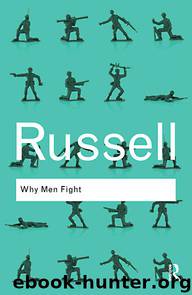Why Men Fight by Bertrand Russell

Author:Bertrand Russell
Language: eng
Format: mobi, epub
Tags: Philosophy, Political, Humanities
ISBN: 9781596050006
Publisher: Cosimo, Inc.
Published: 2004-04-28T18:30:00+00:00
The most important purpose that political institutions can achieve is to keep alive in individuals creativeness, vigour, vitality, and the joy of life. These things existed, for example, in Elizabethan England in a way in which they do not exist now. They stimulated adventure, poetry, music, fine architecture, and set going the whole movement out of which England’s greatness has sprung in every direction in which England has been great. These things coexisted with injustice, but outweighed it, and made a national life more admirable than any that is likely to exist under socialism.
What is wanted in order to keep men full of vitality is opportunity, not only security. Security is merely a refuge from fear; opportunity is the source of hope. The chief test of an economic system is not whether it makes men prosperous, or whether it secures distributive justice (though these are both very desirable), but whether it leaves men’s instinctive growth unimpeded. To achieve this purpose, there are two main conditions which it should fulfil: it should not cramp men’s private affections, and it should give the greatest possible outlet to the impulse of creation. There is in most men, until it becomes atrophied by disuse, an instinct of constructiveness, a wish to make something. The men who achieve most are, as a rule, those in whom this instinct is strongest: such men become artists, men of science, statesmen, empire-builders, or captains of industry, according to the accidents of temperament and opportunity. The most beneficent and the most harmful careers are inspired by this impulse. Without it, the world would sink to the level of Tibet: it would subsist, as it is always prone to do, on the wisdom of its ancestors, and each generation would sink more deeply into a lifeless traditionalism.
But it is not only the remarkable men who have the instinct of constructiveness, though it is they who have it most strongly. It is almost universal in boys, and in men it usually survives in a greater or less degree, according to the greater or less outlet which it is able to find. Work inspired by this instinct is satisfying, even when it is irksome and difficult, because every effort is as natural as the effort of a dog pursuing a hare. The chief defect of the present capitalistic system is that work done for wages very seldom affords any outlet for the creative impulse. The man who works for wages has no choice as to what he shall make: the whole creativeness of the process is concentrated in the employer who orders the work to be done. For this reason the work becomes a merely external means to a certain result, the earning of wages. Employers grow indignant about the trade union rules for limitation of output, but they have no right to be indignant, since they do not permit the men whom they employ to have any share in the purpose for which the work is undertaken. And so the process
Download
This site does not store any files on its server. We only index and link to content provided by other sites. Please contact the content providers to delete copyright contents if any and email us, we'll remove relevant links or contents immediately.
The remains of the day by Kazuo Ishiguro(9000)
Tools of Titans by Timothy Ferriss(8396)
Giovanni's Room by James Baldwin(7346)
The Black Swan by Nassim Nicholas Taleb(7130)
Inner Engineering: A Yogi's Guide to Joy by Sadhguru(6796)
The Way of Zen by Alan W. Watts(6614)
The Power of Now: A Guide to Spiritual Enlightenment by Eckhart Tolle(5784)
Asking the Right Questions: A Guide to Critical Thinking by M. Neil Browne & Stuart M. Keeley(5775)
The Six Wives Of Henry VIII (WOMEN IN HISTORY) by Fraser Antonia(5515)
Astrophysics for People in a Hurry by Neil DeGrasse Tyson(5190)
Housekeeping by Marilynne Robinson(4449)
12 Rules for Life by Jordan B. Peterson(4305)
Ikigai by Héctor García & Francesc Miralles(4275)
Double Down (Diary of a Wimpy Kid Book 11) by Jeff Kinney(4273)
The Ethical Slut by Janet W. Hardy(4255)
Skin in the Game by Nassim Nicholas Taleb(4250)
The Art of Happiness by The Dalai Lama(4130)
Skin in the Game: Hidden Asymmetries in Daily Life by Nassim Nicholas Taleb(4007)
Walking by Henry David Thoreau(3963)
